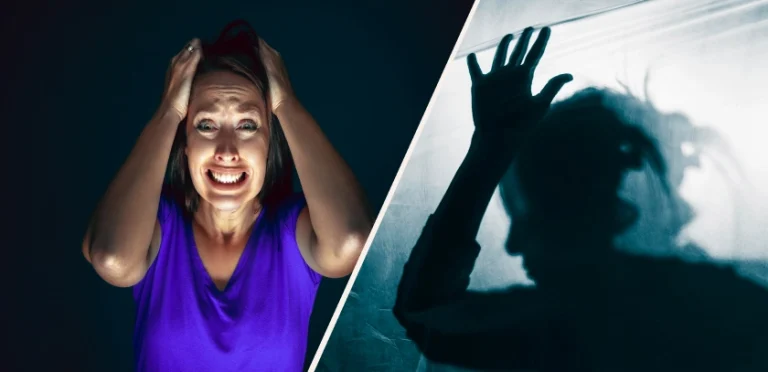
Experiencing a panic attack can be terrifying, leaving many wondering, can you die from a panic attack and what its potential dangers are. A panic attack is an intense surge of fear or discomfort that peaks within minutes, accompanied by symptoms like a racing heart, shortness of breath, and dizziness. Despite the overwhelming nature of these episodes, panic attacks are typically not life-threatening.
However, a lesser-known variant called a silent panic attack occurs without the outward signs of distress, making it difficult to recognize. In silent panic attacks, individuals might experience the same intense internal anxiety and physiological responses without visibly showing their struggle.
What is a Panic Attack?
A panic attack is a sudden and intense episode of fear or anxiety that triggers severe physical reactions despite the absence of real danger. These attacks can occur unexpectedly or as a response to a specific trigger, often characterized by symptoms such as a rapid heart rate, sweating, trembling, shortness of breath, chest pain, nausea, and dizziness.
During a panic attack, individuals may feel a sense of impending doom or a fear of losing control. Panic attacks are a common feature of panic disorder but can also occur in individuals without a diagnosed anxiety condition. Understanding what a panic attack entails is the first step towards managing and mitigating its impact on one’s life.
Types of Panic Attacks:
- Unexpected Panic Attacks: These occur without any obvious trigger, striking suddenly and seemingly out of the blue.
- Situational Panic Attacks: Triggered by specific situations or stimuli, such as public speaking, driving, or being in a crowded place.
- Situationally Predisposed Panic Attacks: These attacks are more likely to occur in certain situations but do not always happen immediately upon encountering the trigger.
- Nocturnal Panic Attacks: Panic attacks that occur during sleep, waking the individual with intense fear and physical symptoms.
- Silent Panic Attacks: Characterized by intense internal anxiety and physical symptoms without obvious external signs of distress.
Can Panic Attacks Kill You?
Panic attacks, despite their intense and often debilitating symptoms, are not fatal. The physical sensations experienced during a panic attack, such as chest pain, heart palpitations, and shortness of breath, can mimic those of a heart attack, leading many to fear for their lives.
Panic attacks do not cause physical harm to the heart or other organs. The primary danger lies in the fear and anxiety they generate, which can significantly impact one’s quality of life and mental health.
While the experience can be extremely distressing and frightening, understanding that panic attacks themselves are not life-threatening can help individuals manage their symptoms more effectively and seek appropriate treatment.
How Long Can Anxiety Attacks Last?
Anxiety attacks, also known as panic attacks, typically peak within 10 minutes and rarely last longer than 30 minutes. However, the duration can vary depending on the individual and the intensity of the attack. Some people may experience waves of panic that seem to extend the overall length of the episode.
It’s not uncommon for the aftereffects, such as feeling drained or emotionally exhausted, to linger for hours or even a day after the attack subsides.
Causes of Panic Attacks
Panic attacks can stem from a variety of factors, often making them unpredictable and confusing. While the exact cause is not always clear, several common triggers and underlying issues can contribute to the onset of these episodes. Identifying potential causes can help in managing and preventing future attacks.
Common Causes of Panic Attacks:
- Genetics: A family history of panic attacks or anxiety disorders can increase the likelihood of experiencing panic attacks.
- Stress: Major life stressors, such as the death of a loved one, divorce, or job loss, can trigger panic attacks.
- Mental Health Conditions: Disorders such as anxiety, depression, or post-traumatic stress disorder (PTSD) are often associated with panic attacks.
- Substance Abuse: The use of drugs and alcohol or withdrawal from these substances can provoke panic attacks.
- Medical Conditions: Health issues like thyroid problems, heart conditions, or respiratory disorders can cause symptoms that mimic or trigger panic attacks.
- Phobias: Exposure to a phobic stimulus, such as a fear of heights or flying, can result in a panic attack.
- Caffeine and Stimulants: A high intake of caffeine or other stimulants can induce panic attack symptoms in some individuals.
Signs of Panic Attack While Sleeping
Experiencing a panic attack while sleeping or a nocturnal panic attack can be particularly distressing. These attacks wake individuals abruptly from sleep, often with intense fear and physical symptoms that can mimic those of a heart attack or other serious conditions. Understanding the signs of a panic attack while sleeping can help individuals recognize and address the issue promptly.
Common Signs of a Panic Attack While Sleeping:
- Sudden waking with intense fear
- Racing or pounding heart
- Shortness of breath or choking sensation
- Sweating or chills
- Trembling or shaking
- Chest pain or discomfort
- Nausea or stomach distress
- Dizziness or lightheadedness
- Feeling of detachment or unreality
- Fear of dying or losing control
How to Handle Panic Attacks?
Dealing with panic attacks can be challenging, but there are effective strategies for managing and minimizing their impact. Learning how to handle panic attacks empowers individuals to regain control over their lives and reduce the frequency and intensity of future episodes.
Understanding Triggers
Identifying triggers that lead to panic attacks is the first step in managing them effectively. Keep a journal to track when and where attacks occur, as well as any thoughts or feelings preceding them. Common triggers include stress, specific situations or environments, caffeine, and certain thoughts or memories.
Deep Breathing and Relaxation Techniques
Practice deep breathing exercises and relaxation techniques to calm the body and mind during a panic attack. Focus on slow, deep breaths, inhaling through the nose and exhaling through the mouth. Progressive muscle relaxation, mindfulness meditation, and visualization exercises can also help alleviate symptoms.
Cognitive Behavioral Therapy (CBT)
CBT is a highly effective therapy for treating panic attacks and anxiety disorders. Through CBT, individuals learn to identify and challenge negative thought patterns and beliefs that contribute to panic attacks. This therapy helps individuals develop coping skills and strategies for managing anxiety symptoms.
Lifestyle Changes
Making lifestyle changes can reduce the frequency and severity of panic attacks. Prioritize regular exercise, healthy eating, adequate sleep, and stress management techniques. Limit caffeine and alcohol consumption, as they can exacerbate anxiety symptoms.
Seek Professional Help
If panic attacks persist despite self-help strategies, seek professional help from a therapist or psychiatrist. A mental health professional can provide personalized treatment, such as therapy, medication, or a combination of both, to address underlying causes and manage symptoms effectively.
How to Stop Shaking from Anxiety Immediately?
When experiencing shaking due to anxiety, finding quick relief can be essential in regaining a sense of control and comfort. Several strategies can help alleviate shaking and calm the nervous system almost instantly.
First, focusing on slow, deep breathing can help regulate the body’s response to stress and reduce trembling. Additionally, practicing mindfulness techniques, such as grounding exercises or guided imagery, can redirect attention away from anxious thoughts and toward the present moment, promoting relaxation. Engaging in physical activity, such as going for a brisk walk or doing some gentle stretches, can also help release tension and reduce shaking.
Finally, seeking support from a trusted friend or therapist can provide reassurance and guidance in managing anxiety symptoms effectively.
Can Panic Attacks Cause Brain Damage?
Panic attacks can be incredibly distressing experiences, prompting concerns about potential long-term effects on the brain. However, there is no evidence to suggest that panic attacks cause brain damage. While panic attacks can feel overwhelming and may lead to temporary cognitive impairment during the episode, such as difficulty concentrating or thinking clearly, these effects typically dissipate once the attack subsides.
It’s important to remember that panic attacks primarily involve the activation of the body’s fight-or-flight response, which is a natural and adaptive physiological reaction to perceived threats. Seeking support from mental health professionals and implementing coping strategies can help individuals manage panic attacks and minimize their impact on overall well-being.
The Bottom Line
While panic attacks can be terrifying and debilitating, it’s crucial to understand that they are not inherently life-threatening. Despite the intense physical and psychological symptoms they entail, panic attacks do not cause death. By seeking support, understanding triggers, and implementing effective coping strategies, individuals can learn to manage panic attacks and alleviate their distressing symptoms.
Remember, although panic attacks can feel overwhelming, help and resources are available to support you in navigating these challenges.
Frequently Asked Questions
1. Can you die from a panic attack in your sleep?
No, panic attacks during sleep are not fatal. They can feel intense and frightening, but they don’t cause death. If they happen often, it’s a good idea to see a doctor.
2. Are panic attacks dangerous?
Panic attacks are not life-threatening, but they can feel overwhelming. The symptoms can mimic serious health issues, which makes them distressing.
3. Can you die from a panic attack?
Panic attacks themselves cannot kill you, though they can feel terrifying with symptoms like chest pain, racing heartbeat, or dizziness.
4. Can you pass out from a panic attack?
Yes, in rare cases, a panic attack may cause fainting due to hyperventilation or a sudden drop in blood pressure. However, most people do not pass out during a panic attack.




